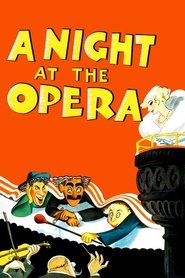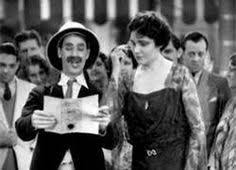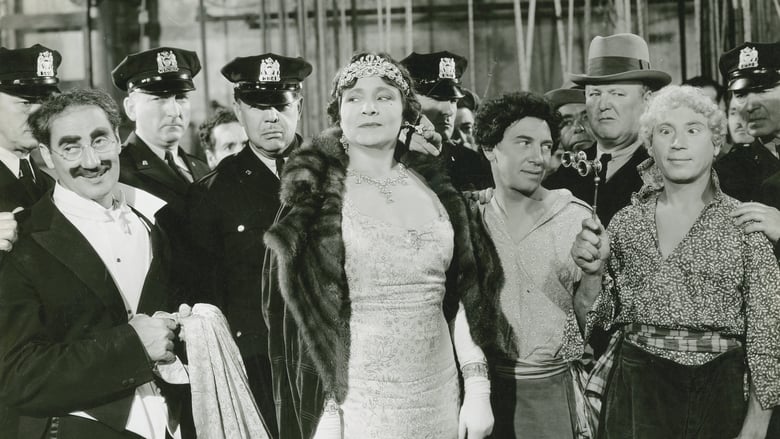

The brothers found themselves without a studio, without one of their members (Zeppo, who left to pursue a career off camera), and without any future film prospects. The last of the Paramount films, Duck Soup (1933), although hailed as a cult classic now and often considered the team's masterpiece, was a miserable flop both critically and commercially.

The very virtues touted by those who prefer the earlier films are exactly what brought the Marxes to Metro in the first place and what made them willingly follow the advice of the studio's Boy Wonder production chief, Irving G.
A NIGHT AT THE OPERA MARX BROTHERS TORRENT MOVIE
With its justly famous stateroom scene, the verbal bantering and punning of Groucho and Chico, and the shredding of an entire Verdi opera, this movie has outlasted all the others in the opinion of most moviegoers as the brothers' all-time classic.

They are superior, they say, for their lack of both sentimentality and clear logic, for the way the brothers - unfettered by serious or consistent character motivations and definitions - run rampant over the rather fantastic worlds created in the films.ĭefenders of the MGM films will usually admit that the franchise went steadily downhill over the years but they like to point out that at least the later films didn't include the boring Zeppo and it's hard to top A Night at the Opera. Paramount purists will hail the anarchic comedy of the earlier films, the ones more closely akin to the Marx Brothers' stage career. the MGM period ( A Day at the Races, Go West, etc.), which was kicked off by A Night at the Opera, their most successful movie. Marx Brothers fans are generally divided over the quality of the early '30s Paramount period ( Animal Crackers, Horse Feathers, Duck Soup, etc.) vs. Claypool), Kitty Carlisle (Rosa), Allan Jones (Ricardo), Walter Woolf King (Rudolfo).īW-92m. Driftwood), Chico Marx (Fiorello), Harpo Marx (Tomasso), Margaret Dumont (Mrs. Kaufman, Morrie RyskindĬast: Groucho Marx (Otis B. They get their revenge, however, by totally devastating the company's production of Il Trovatore, kidnapping Rudolfo, and triumphantly substituting Rosa and Ricardo in the leads. Once in the States, Rudolfo has both Driftwood and Rosa fired from the company. Ricardo's agent, Fiorello, and Rudolfo's put-upon dresser, Tomasso, also become involved in Driftwood's scheme, which brings everyone together on an ocean liner bound for New York. Rosa is in love with the tenor Ricardo, who has been consigned to the chorus by his rival, Rudolfo. The stars of the Milan-based company are the vain, mean-spirited Rudolfo and the sweet, talented Rosa. Claypool into investing in an opera company by promising to secure her entry into high society. Driftwood is trying to woo the wealthy Mrs. When Detective Henderson arrives with the police looking for the stowaways, the stage is a shambles, but the day is saved when Lassparri refuses to perform any longer and Ricardo takes his place, with Rosa by his side.Ĭon man and "promoter" Otis B. Tomasso crosses bows with the conductor, the music to "Take Me Out to the Ball Game" is substituted for the opera's score, and Driftwood sells peanuts in the aisles. Driftwood, Tomasso and Fiorello have a plan, though, and turn the performance into chaos.

Meanwhile, although Rosa and Lassparri are set to perform Il Trovatore, Lassparri refuses to sing with her because she rejects his amorous advances. When they dock in New York, the stowaways unsuccessfully pose as a trio of bearded aviators, then hide in Driftwood's hotel to avoid deportation. They stay in Driftwood's room, which is crowded with one occupant, but bulges to overflowing as the stowaways, assorted maids, waiters, repairmen, and a woman looking for her Aunt Minnie, wander in. Rosa also has an offer to go to America and is sad to leave Ricardo, until she learns that he is stowing away with Tomasso and his old friend Fiorello, who has a mutilated contract with Driftwood for Ricardo's services. Lassparri is a cad who beats his dresser Tomasso, and tries to captivate Rosa, a soprano who only loves chorus singer Ricardo Barone. He does introduce her to opera impresario Herman Gottlieb, however, who convinces her to hire tenor Rudolfo Lassparri for his New York opera company. Driftwood to help her enter society, but he merely helps himself to her money.


 0 kommentar(er)
0 kommentar(er)
